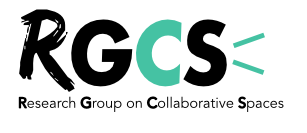Journal of Openness, Commons & Organizing (JOCO) is affiliated to the Research Group on Collaborative Spaces (RGCS) and shares the values of open and citizen sciences. Its ambition is interdisciplinary, with contributions from fields such as management, organization studies, innovation studies, organizational sociology, urban sociology, economic geography, anthropology, political sciences, philosophy, psychology.
JOCO provides open access to its content on the principle that making research freely available to the public supports a greater global knowledge exchange.
1. Journal description:
The Journal of Open Commons & Organizing (JOCO) aims at being a forum for research and a platform for discussion
about old and new ways of working and organizing explored from open and citizen sciences perspectives.
Our main goal is to pursue openness as a distinct, consistent and integrated field of research and our approach
to openness is two-fold: not only are we interested in contributions to open science topics and methodologies,
but we are also committed to creating an open space where heterogeneous paradigms, disciplines and communities may
interact recursively and inclusively at the different stages of their inputs to explore old and new ways of working.
We welcome contributions from researchers, practitioners, artists, activists, and we highly encourage collective
inputs regarding old and new ways of working (in corporate, scientific and activist worlds) and their relationships
with new and open modes of management and organizing, new ways of living and alternative forms of society.
Studies elaborating systematic links between work, organizing and societal or political dynamics are particularly welcome.
We invite all social sciences methods and methodologies. We are open to both empirical, conceptual and
philosophical contributions. A non-exhaustive list of topics for contributions includes:
- Conceptual discussions about openness and the process of opening;
- History of work and management in an open world;
- Changing nature of work: New ways of working, of managing and organizing in an open world;
- Understanding change in professions and expertise in an increasingly open and interconnected society;
- Collaborative entrepreneurship and coworking;
- Hackers and makers movements;
- Hackerspaces, makerspaces, FabLabs, biohackerspaces, third-places;
- Open Innovation;
- Open strategy and open strategizing;
- Democracy and open organizing;
- New ways of working and societal transformations;
- New practices and cultures of participation in technology and knowledge communities;
- New forms of collaboration, partnerships and participation in addressing grand challenges at the societal level
- Open policies;
- Open sciences and citizen sciences;
- Collaborative ethnography;
- Crowd research;
- Knowledge and digital commons;
- Theories of commons and communities;
- Communalizations practices and societies;
- Philosophies and metaphysics of commons and communities;
- Public policies devoted to commons, common good and communities;
- Education to openness, open knowledge and common good;
- Learning processes of openness and common good;
- New research methods devoted to openness, commons and common good;
- Open data based research.
2. Instructions for authors: Publication frequency: JOCO is published twice a year. Editorial process: It includes both an edited and a reviewed section. The edited section is composed of editorial addresses and White Papers published by the RGCS. The reviewed section includes articles which will follow an Open Review Process (OPR). OPR is based on open participation of wider communities, i.e. both academics and any interested parties outside the academic circles may contribute to the review process and article development, and open interactions, i.e. direct reciprocal discussion between author(s) and reviewers, and/or between reviewers. Each publication will include: the accepted version of the paper (a), another version open to edits/comments/revisions (b), the knowledge commons produced by the research published (open interactions, reports, videos, and data; collective posts) (c). All open seminars connected to our articles are online on a specific Youtube channel: https://www.youtube.com/@rgcsopenseminars7872.Several new sections will be released soon, in particular a ‘Dialog section’, ‘doctoral voice’ section and ‘democratic voice’ section. Guidelines of JOCO open process Author charges: No article processing charges nor article submission charges are requested to the authors.


3.Copyright Notice & Creative Commons license Authors who publish with this journal agree to the following terms: - Authors retain copyright and grant the journal right of first publication with the work simultaneously licensed under a Creative Commons Attribution License that allows others to share the work with an acknowledgement of the work's authorship and initial publication in this journal. - Authors are able to enter into separate, additional contractual arrangements for the non-exclusive distribution of the journal's published version of the work (e.g., post it to an institutional repository or publish it in a book), with an acknowledgement of its initial publication in this journal. - Authors are permitted and encouraged to post their work online (e.g., in institutional repositories or on their website) prior to and during the submission process, as it can lead to productive exchanges, as well as earlier and greater citation of published work. Publishing address: ESCP Business School. 8 Av. de la Porte de Champerret, 75017 Paris FRANCE. ISSN 2967-1833
4. JOCO Team: Co-Editors in Chief: - Paula Ungureanu (University of Modena and Reggio Emilia) - Stefan Haefliger (Stockholm School of Economics and Bayes Business School) - François-Xavier de Vaujany (PSL, Université Paris-Dauphine) Associate Editors (AE): - Amélie Bohas (Université de Lyon) - Sabine Carton (UGA) - Emmanuel Costa (UDESC) - Aurore Dandoy (ESDES Business School) - Julie Fabbri (emlyon business school) - Anna Glaser (ESCP Business School) - Albane Grandazzi (Grenoble Ecole de Management) - Amadou Lo (TBS) - Chiara Tagliaro (Politecnico di Milano) - Paula Ungureanu (University of Modena and Reggio Emilia) - David Vallat (Science Po Lyon). - The 93 coordinators of RGCS are all members of the scientific committee. Editorial team: - Aurore Dandoy (ESDES Business School) - Gislene Feiten Haubrich (CITEM) - Mickael Peiro (IUT Paul Sabatier). Dedicated email: joco.rgcs@gmail.com

JOCO, Journal of Openness, Commons & Organizing
JOCO Vol4, Issue1:
- When the Machine Stops: What a 1909 Book Can Teach Us About Technocracy and Human Agency in the Age of AI, by Paula Ungureanu
- The Noise of Progress: a conversation with Mark Coeckelbergh on AI, capitalism, and Democratic Renewal, by Gislene Feiten Haubrich
- Faces or masks? Representations of oneself and others today, by Elen Riot
- Beyond Politus, Ordinary Democracy in Organization, by François-Xavier de Vaujany
JOCO Vol3, Issue2:
- How to study technology when the nature of work changes, by Stefan Haefliger
- Between Cypherpunk and Commons. Navigating Blockchain’s ideology of social change, by Paula Ungureanu
- Commoning by doing it yourself! Thoughts from the hackerspace and its passengers, by Mickael Peiro
- From Emplacement to Virtuality: A sociomaterial Perspective on the Emotional Transformations in Coworking Spaces during COVID-19, by Cochis Carlotta
- Silencing Capitalism?, by François-Xavier de Vaujany
JOCO Vol3, Issue1:
- Organizing democratic space: The end of continuum?, by François-Xavier de Vaujany
- From Explainable AI to Explaining to AI (X2AI): Representational Practices in AI at Work, by Ella Hafermalz, Marleen Huysman and Jana Retkoswky
- Organizing a Cognitive Community to Open the Access to Legal Information. The case of OpenJustice.be, by Christophe Dubois, Lisa Pelssers and Martin Erpicum
JOCO Vol2, Issue2:
- Editorial article, by Stefan Haefliger, Paula Ungureanu and François-Xavier de Vaujany
- The social and political challenges of open innovation, by Thierry Isckia and Xavier Parisot
- Is Hybrid Working the way for participatory democracy in organising?, by Gislene Feiten Haubrich
- “There’s joy in innovation”: exploring the ways of user innovation with Eric von Hippel, by Gislene Feiten Haubrich
- Societal and political dimensions of organizations and innovations: Exploring the relevance of the ecosystem, by Montserrat Pareja-Eastaway
- Artificial intelligence and the changing costs and benefits of engaging in open and collaborative science, by Susanne Beck and Marion Poetz
JOCO Vol2, Issue1:
- Editorial article, by François-Xavier de Vaujany, Stefan Haefliger and Paula Ungureanu
- Organizing Commons in Time and Space with Framapads: Feedback from an Open Community, by RGCS collective
- Working in parallel time-spaces: a methodology of retro-prospective anticipation, by Philippe Mairesse
- Tenses and Tensions: Temporality in the Future of Work, by Gazi Islam
- Exploring time, space and new ways of working: a conversation with ChatGPT, by Gislene Feiten Haubrich and Melissa M. Sexton
JOCO Vol1, Issue2:
- Editorial article by François-Xavier de Vaujany, Stefan Haefliger and Paula Ungureanu
- Interview of Pr. Gabriella Coleman, by Gislene Feiten Haubrich
- The crisis of the Commons: An inquiry into 'Technologies of the Commons' as Tools for Organizing, by Ian Munro
- Back to the office? An exploration of post-pandemic work life, by Fiza Brakel-Ahmed
- Managing Knowledge Commons in a Connected World: An Organizational Perspective, by David Vallat
JOCO Vol1, Issue1:
- Opening article by Paula Ungureanu, Stefan Haefliger and François-Xavier de Vaujany
- We/Me-ness: Meanings of Community, by Ann Cunliffe
- A pragmatist critique of the economic theory of the commons, by Philippe Lorino
- Communs & Résilience (French), par Jean-François Boisson
- Le Tour à vélo : une démarche de « recherche-voyage » (French), par Aurélien Denaes et Fanny Lebrech
- Dialogue actually is the weapon of the powerful (Interview of Gibson Burrell, by Gislene Feiten Haubrich)
- Walking the commons: drifting together the city, by RGCS members
- The new time-space of families in a pandemic world: Invitation to a nomadology of the sofa, by François-Xavier de Vaujany
